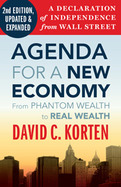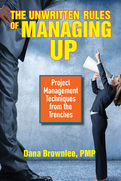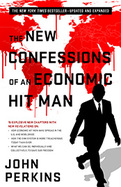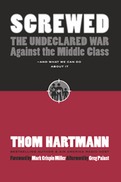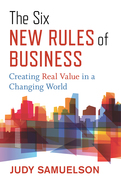Search Results: "how wealth rules"
Results 25-30 of 968
NEW EDITION, REVISED AND UPDATED
Nearly two years after the economic meltdown, joblessness and foreclosures are still endemic, Wall Street executives are once again getting massive bonuses, and our leaders in Washington lack the will to make desperately needed fundamental changes to the economy. Change will have to come from below. Agenda for a New Economy is the handbook for that revolution.
In this revised and updated edition David Korten has fleshed out his vision of the alternative to the corporate Wall Street economy: a Main Street economy based on locally owned, community-oriented “living enterprises” whose success is measured as much by their positive impact on people and the environment as by their positive balance sheet. We will lose nothing in the process because, as Korten ably demonstrates, the supposed services Wall Street offers are simply a con game. And Korten now offers more in-depth advice on how to mount a grassroots campaign to bring about an economy based on shared prosperity, ecological stewardship, and citizen democracy.
What do you do when the biggest threat to your project is your boss? It's not that your boss is out to get you. In fact, bosses generally mean well. But clueless leadership from a well-intentioned boss can sometimes cause more damage than a criminal mastermind tying your project to the railroad tracks.
The Unwritten Rules of Managing Up provides refreshingly practical and candid insight into the best practices and techniques that project managers have successfully used for decades to manage a wide variety of senior-level stakeholders—ranging from perfectly competent and pleasant to downright dysfunctional and inept.
While managing up is an incredibly valuable skill for virtually any type of boss (not just the difficult ones), the book includes recommendations for managing six particularly challenging—and common—types of senior leaders. They are the bombastic Tornado, who takes over meetings without realizing it; the Wishful Thinker, who regularly asks the impossible; the Clueless Chameleon, who can't quite decide what he or she really wants (but still holds you responsible for delivering it); the MIA Boss, who is just not around enough; the Meddlesome Micromanager, who hovers and insists you complete a task his or her way; and the Naked Emperor, who falls in love with his or her own crazy ideas. Brownlee also offers basic techniques to use with any boss, even a great one.
This book is not just for professionals seeking to enhance their workplace effectiveness but also for senior leaders interested in addressing their blind spots and coaching others toward a more collaborative, results-focused leadership approach.
The Unwritten Rules of Managing Up provides refreshingly practical and candid insight into the best practices and techniques that project managers have successfully used for decades to manage a wide variety of senior-level stakeholders—ranging from perfectly competent and pleasant to downright dysfunctional and inept.
While managing up is an incredibly valuable skill for virtually any type of boss (not just the difficult ones), the book includes recommendations for managing six particularly challenging—and common—types of senior leaders. They are the bombastic Tornado, who takes over meetings without realizing it; the Wishful Thinker, who regularly asks the impossible; the Clueless Chameleon, who can't quite decide what he or she really wants (but still holds you responsible for delivering it); the MIA Boss, who is just not around enough; the Meddlesome Micromanager, who hovers and insists you complete a task his or her way; and the Naked Emperor, who falls in love with his or her own crazy ideas. Brownlee also offers basic techniques to use with any boss, even a great one.
This book is not just for professionals seeking to enhance their workplace effectiveness but also for senior leaders interested in addressing their blind spots and coaching others toward a more collaborative, results-focused leadership approach.
Featuring 15 explosive new chapters, this new edition of the New York Times bestseller brings the story of Economic Hit Men up-to-date and, chillingly, home to the U.S.―but it also gives us hope and the tools to fight back.Featuring 15 explosive new chapters, this new edition of the New York Times bestseller brings the story of Economic Hit Men up-to-date and, chillingly, home to the U.S.―but it also gives us hope and the tools to fight back.
The previous edition of this now-classic book revealed the existence and subversive manipulations of "economic hit men. John Perkins wrote that they are highly paid professionals who cheat countries around the globe out of trillions of dollars. Their tools include fraudulent financial reports, rigged elections, payoffs, extortion, sex, and murder. In Perkins's case the tool was debt-convincing strategically important countries to borrow huge amounts of money for enormous, development projects that served the very rich while driving the country deeper into poverty and debt. And once indebted, these countries could be controlled.
In this latest edition, Perkins provides revealing new details about how he and others did their work. But more importantly, in an explosive new section he describes how the EHM tools are being used around the world more widely than ever-even in the U. S. itself. The cancer has metastasized, yet most people still aren't aware of it. Fear and debt drive the EHM system. We are hammered with messages that terrify us into believing that we must pay any price, assume any debt, to stop the enemies who, we are told, lurk at our doorsteps. The EHM system-employing false economics, bribes, surveillance, deception, debt, coups, assassinations, unbridled military power-has become the dominant system of economics, government, and society today. It has created what Perkins calls a Death Economy. But Perkins offers hope: he concludes with dozens of specific, concrete suggestions for actions all of us can take to wrest control of our world away from the economic hit men, and help give birth to a Life Economy.
The previous edition of this now-classic book revealed the existence and subversive manipulations of "economic hit men. John Perkins wrote that they are highly paid professionals who cheat countries around the globe out of trillions of dollars. Their tools include fraudulent financial reports, rigged elections, payoffs, extortion, sex, and murder. In Perkins's case the tool was debt-convincing strategically important countries to borrow huge amounts of money for enormous, development projects that served the very rich while driving the country deeper into poverty and debt. And once indebted, these countries could be controlled.
In this latest edition, Perkins provides revealing new details about how he and others did their work. But more importantly, in an explosive new section he describes how the EHM tools are being used around the world more widely than ever-even in the U. S. itself. The cancer has metastasized, yet most people still aren't aware of it. Fear and debt drive the EHM system. We are hammered with messages that terrify us into believing that we must pay any price, assume any debt, to stop the enemies who, we are told, lurk at our doorsteps. The EHM system-employing false economics, bribes, surveillance, deception, debt, coups, assassinations, unbridled military power-has become the dominant system of economics, government, and society today. It has created what Perkins calls a Death Economy. But Perkins offers hope: he concludes with dozens of specific, concrete suggestions for actions all of us can take to wrest control of our world away from the economic hit men, and help give birth to a Life Economy.
Screwed
2007
By the bestselling author and XM and Sirius Satellite radio host heard on more than eighty radio stations coast to coast seven days a week
Reveals how the middle class, nurtured as the backbone of democracy by our Founding Fathers, is being undermined by so-called conservatives
Shows how we can reverse the erosion of the middle class and restore the egalitarian vision of the Founders
Expanded edition with a new chapter on immigration and a new afterword by Greg Palast
The American middle class is on its deathbed. Ordinary folks who put in a solid day's work can no longer afford to buy a house, send their kids to college, or even get sick. If you're not a CEO, you're probably screwed.
America wasn't meant to be like this. Air America Radio host Thom Hartmann shows that our Founding Fathers worked hard to ensure that a small group of wealthy people would never dominate this country--they'd had enough of aristocracy. They put policies in place to ensure a thriving middle class. When the middle class took a hit, beginning in the post-Civil War Gilded Age and culminating in the Great Depression, democracy-loving leaders like Theodore and Franklin Roosevelt, Harry Truman, and Dwight Eisenhower revitalized it through initiatives like antitrust regulations, fair labor laws, the minimum wage, Social Security, and Medicare.
So what happened? In the last twenty-five years, we've witnessed an undeclared war against the middle class. The so-called conservatives waging this war are only interested in conserving--and steadily increasing--their own wealth and power. Hartmann shows how, under the guise of "freeing" the market, they've systematically dismantled the programs set up by Republicans and Democrats to protect the middle class and have installed policies that favor the superrich and corporations.
But it's not too late to return to the America our Founders envisioned. Hartmann outlines a series of commonsense proposals that will ensure that our public institutions are not turned into private fiefdoms and that people's basic needs--education, health care, a living wage--are met in a way that allows the middle class to expand, not shrink.
America will be stronger with a growing, prospering middle class--rule by the rich will only make it weaker. Democracy requires a fair playing field, and it will survive only if We the People stand up, speak out, and reclaim our democratic birthright.
- By the bestselling author and XM and Sirius Satellite radio host heard on more than eighty radio stations coast to coast seven days a week
- Reveals how the middle class, nurtured as the backbone of democracy by our Founding Fathers, is being undermined by so-called conservatives
- Shows how we can reverse the erosion of the middle class and restore the egalitarian vision of the Founders
- Expanded edition with a new chapter on immigration and a new afterword by Greg Palast
The first and only comprehensive resource designed to empower everyday people with insider knowledge on moving money for a more equitable economy.
The money myths end here.
We don't need to choose between creating meaningful wealth for ourselves and our families today, or supporting social movements creating a better tomorrow. We don't all need to become certified financial "experts" to be economically empowered and make a real difference in our communities. And we're far from powerless when it comes to changing the financial system, just because we don't happen to belong to the 1%. Quite the opposite.
Financial activism is how everyday people radically reimagine money as a tool for widespread well-being, instead of a weapon of absurdly increasing inequality. It's the antidote to traditional finance that evokes confusion, trauma, and (in the best-case scenario) straight-up boredom. It's how we-the underestimated-collectively resist systems that cause harm to people and the planet for the sake of profit, reclaim wealth that's been stolen, and redesign our relationships with capital and one another, in ways big and small.
Going beyond tried financial literacy, The Financial Activist Playbook offers eight accessible, actionable, "choose-your-own-adventure" strategies for readers to experiment with. Drawing on timely insider knowledge from the worlds of impact investing, social justice, and more, Rashid illuminates a treasure trove of stories: demonstrating how people power can flow big bucks out of extractive industries, and into the economy of care and abundance we deserve.
Playbook readers will be equipped to start visualizing and influencing the unique networks of wealth all around each of us, with strategies like
The money myths end here.
We don't need to choose between creating meaningful wealth for ourselves and our families today, or supporting social movements creating a better tomorrow. We don't all need to become certified financial "experts" to be economically empowered and make a real difference in our communities. And we're far from powerless when it comes to changing the financial system, just because we don't happen to belong to the 1%. Quite the opposite.
Financial activism is how everyday people radically reimagine money as a tool for widespread well-being, instead of a weapon of absurdly increasing inequality. It's the antidote to traditional finance that evokes confusion, trauma, and (in the best-case scenario) straight-up boredom. It's how we-the underestimated-collectively resist systems that cause harm to people and the planet for the sake of profit, reclaim wealth that's been stolen, and redesign our relationships with capital and one another, in ways big and small.
Going beyond tried financial literacy, The Financial Activist Playbook offers eight accessible, actionable, "choose-your-own-adventure" strategies for readers to experiment with. Drawing on timely insider knowledge from the worlds of impact investing, social justice, and more, Rashid illuminates a treasure trove of stories: demonstrating how people power can flow big bucks out of extractive industries, and into the economy of care and abundance we deserve.
Playbook readers will be equipped to start visualizing and influencing the unique networks of wealth all around each of us, with strategies like
- Shifting collective budgets and bank dollars;
- Flexing our role as everyday philanthropists;
- Leveraging the magic of community investment;
- And so much more.
The rules of business are changing dramatically. The Aspen Institute's Judy Samuelson describes the profound shifts in attitudes and mindsets that are redefining our notions of what constitutes business success.
Dynamic forces are conspiring to clarify the new rules of real value creation—and to put the old rules to rest. Internet-powered transparency, more powerful worker voice, the decline in importance of capital, and the complexity of global supply chains in the face of planetary limits all define the new landscape. As executive director of the Aspen Institute Business and Society Program, Judy Samuelson has a unique vantage point from which to engage business decision makers and identify the forces that are moving the needle in both boardrooms and business classrooms.
Samuelson lays out how hard-to-measure intangibles like reputation, trust, and loyalty are imposing new ways to assess risk and opportunity in investment and asset management. She argues that “maximizing shareholder value” has never been the sole objective of effective businesses while observing that shareholder theory and the practices that keep it in place continue to lose power in both business and the public square. In our globalized era, she demonstrates how expectations of corporations are set far beyond the company gates—and why employees are both the best allies of the business and the new accountability mechanism, more so than consumers or investors.
Samuelson's new rules offer a powerful guide to how businesses are changing today—and what is needed to succeed in tomorrow's economic and social landscape.
Dynamic forces are conspiring to clarify the new rules of real value creation—and to put the old rules to rest. Internet-powered transparency, more powerful worker voice, the decline in importance of capital, and the complexity of global supply chains in the face of planetary limits all define the new landscape. As executive director of the Aspen Institute Business and Society Program, Judy Samuelson has a unique vantage point from which to engage business decision makers and identify the forces that are moving the needle in both boardrooms and business classrooms.
Samuelson lays out how hard-to-measure intangibles like reputation, trust, and loyalty are imposing new ways to assess risk and opportunity in investment and asset management. She argues that “maximizing shareholder value” has never been the sole objective of effective businesses while observing that shareholder theory and the practices that keep it in place continue to lose power in both business and the public square. In our globalized era, she demonstrates how expectations of corporations are set far beyond the company gates—and why employees are both the best allies of the business and the new accountability mechanism, more so than consumers or investors.
Samuelson's new rules offer a powerful guide to how businesses are changing today—and what is needed to succeed in tomorrow's economic and social landscape.


